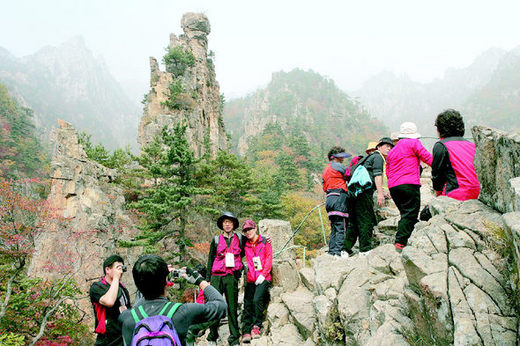 |
|
Tourists from South Korea at Mt. Geumgang.
|
In face of Hill’s remarks, officials say that cooperation cannot be dropped
The South Korean presidential office has not made an official response to U.S. assistant secretary of state and nuclear talks envoy Christopher Hill’s recent remarks that the Mt. Geumgang (Kumgang) tour program was intended in the first place to provide the needed cash flow to prop up the Kim Jong-il regime, but it is still making waves among high-ranking government officials. "I think the remarks should be interpreted in the context that it would not be appropriate to pursue the tourism project at a time when a nuclear test is underway on the other side," Song Min-soon, chief presidential secretary for security, said at a forum in Seoul. "But it is a matter that the South Korean government should decide upon, not other countries." Some at the presidential office are expressing stronger displeasure at Assistant Secretary Hill’s remarks. "The Mt. Geumgang project is in the private business sector, and the U.S. should acknowledge that it is a unique business designed to ease disparity between the peoples of the two Koreas," an official said on condition of anonymity. "I doubt that it is too much to invest US$1 million every month for such [a symbolic] business." Since the tourism program began late 1998, South Korea have paid about $451 million in admission fees to North Korea. An average of about 40,000 South Koreans take trips to Mt. Geumgang each month, paying about $1 million in admission fees. "When you go to Yellowstone National Park in the U.S., it would cost you at least US$100 for a visa and additional $15 for sightseeing...But you can go to Mt. Geumgang without a visa and only $30 for a tour," another official noted. "Is it really pouring money into a ’bottomless jar’ as argued by some in Washington?" Mt. Geumgang’s one-day entrance fee is $30. For two days, it is $40, and for three days, $80, which is the money North Korea receives. All other fees, such as transportation and accommodation, go to South Korea’s Hyundai Asan Corp. However, it is unclear whether the South Korean government will continue inter-Korean cooperation projects such as Mt. Geumgang in the face of rising pressure from the U.S. to block any money flow to the North following Pyongyang’s nuclear test last week. It would not be an stretch to consider that the U.S. could suspend the operation of Hyundai Group on its soil, citing its business links with the communist country. Hyundai Asan, an arm of Hyundai Group, is spearheading the tour program at Mt. Geumgang. Chief Presidential Secretary Song said that it would be impossible to stop the entire operation, but "we should consider changes if necessary." Song did not specify what the changes might mean, but some experts say they would entail the use of food or other goods that the North needs rather than cash for payment. Indeed, Hyundai Group is reportedly considering the move. Another way could be changing the way the compensation is paid. Currently, the money is sent monthly to North Korean accounts in Chinese banks by Hyundai Asan Corp. Under one proposed method, the South would pay in hard currency but would send the money to a third country, allowing the North to withdraw it only when it makes moves to ease tensions surrounding its nuclear test. This could be an effective way to encourage the cash-strapped North to the negotiating table. Still, it is anyone’s guess whether the North will agree to the changes.





